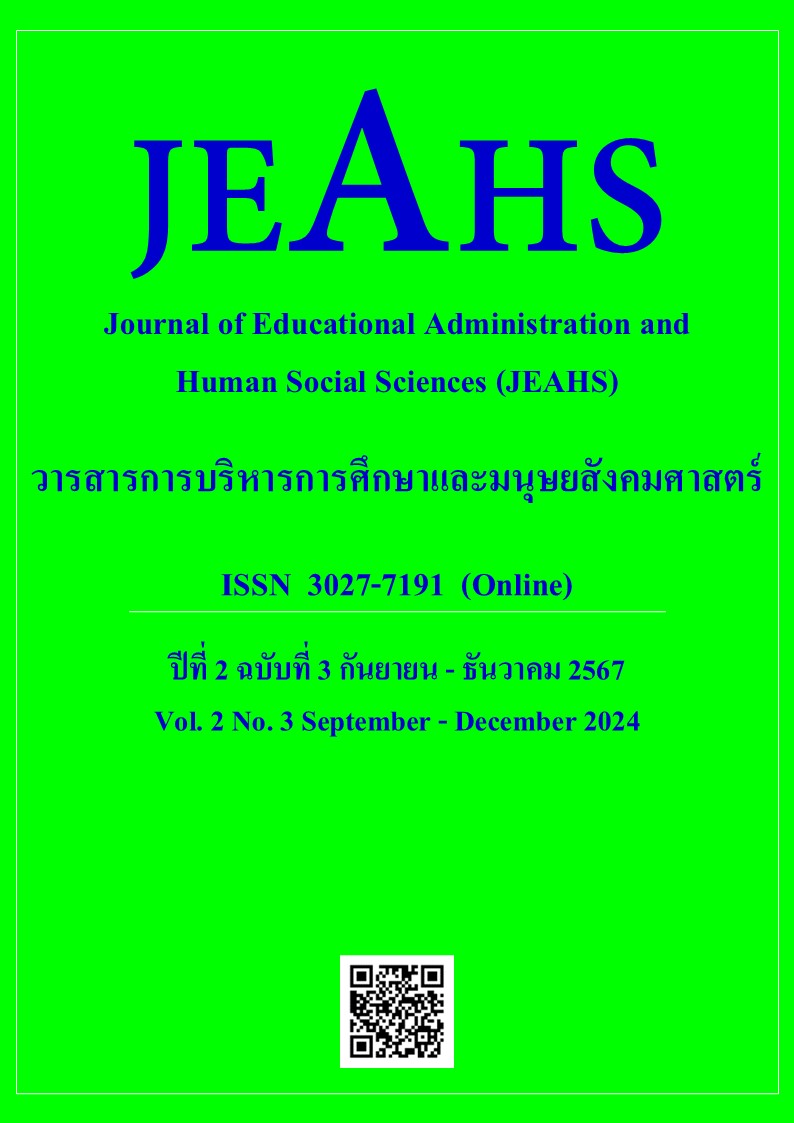ปัญญาประดิษฐ์เพื่อการบริหารการศึกษายุคดิจิทัล
Main Article Content
บทคัดย่อ
ปัญญาประดิษฐ์ (Artificial Intelligence: AI) กำลังเข้ามามีบทบาทสำคัญในการปรับเปลี่ยนรูปแบบการจัดการศึกษาในยุคดิจิทัล ทั้งในด้านการเรียนการสอน การประเมินผู้เรียน การบริหารองค์กร และการให้บริการทางการศึกษา ด้วยความสามารถในการประมวลผลข้อมูลปริมาณมหาศาล วิเคราะห์รูปแบบ และตัดสินใจแบบอัตโนมัติ ระบบปัญญาประดิษฐ์ นำไปสู่การยกระดับประสิทธิภาพ การปรับปรุงผลลัพธ์การเรียนรู้ และการขยายโอกาสทางการศึกษาในวงกว้าง อย่างไรก็ตาม การนำปัญญาประดิษฐ์มาใช้ในการบริหารการศึกษายังมีข้อท้าทายหลายประการ ทั้งในแง่ของความพร้อมด้านโครงสร้างพื้นฐาน การพัฒนาทรัพยากรมนุษย์ การบริหารความเสี่ยง และประเด็นจริยธรรมที่ต้องพิจารณา
บทความนี้มีวัตถุประสงค์เพื่อทบทวนวรรณกรรมเกี่ยวกับการประยุกต์ใช้ปัญญาประดิษฐ์ในการบริหารการศึกษายุคดิจิทัลโดยนำเสนอ 1) การประยุกต์ใช้ปัญญาประดิษฐ์ในการบริหารการศึกษายุคดิจิทัล 2) ความท้าทายในการนำปัญญาประดิษฐ์มาปรับใช้ในการศึกษา และ 3) แนวทางการขับเคลื่อนการใช้ปัญญาประดิษฐ์อย่างมีประสิทธิภาพและรับผิดชอบ โดยใช้เทคนิคการทบทวนวรรณกรรมอย่างเป็นระบบ สังเคราะห์จากบทความวิชาการและงานวิจัยชั้นนำในวงการที่ผ่านกระบวนการกลั่นกรองอย่างเข้มข้น เพื่อนำไปสู่ข้อเสนอแนะเชิงนโยบายสำหรับการจัดทำแผนปฏิบัติการด้านการใช้ปัญญาประดิษฐ์ในหน่วยงานการศึกษา ที่ครอบคลุมการวางกลยุทธ์ การพัฒนาความพร้อม การบริหารความเปลี่ยนแปลง ตลอดจนการสร้างกลไกการกำกับดูแลในเชิงจริยธรรม เพื่อใช้ศักยภาพปัญญาประดิษฐ์ในการยกระดับคุณภาพการศึกษาและสร้างความเท่าเทียมทางการเรียนรู้ได้อย่างเต็มที่
Article Details

อนุญาตภายใต้เงื่อนไข Creative Commons Attribution-NonCommercial-NoDerivatives 4.0 International License.
บทความที่ส่งมาขอรับการตีพิมพ์ในวารสารวารสารการบริหารการศึกษาและมนุษยสังคมศาสตร์ จะต้องไม่เคยตีพิมพ์หรืออยู่ระหว่างการพิจารณาจากผู้ทรงคุณวุฒิเพื่อตีพิมพ์ในวารสารอื่น รวมทั้งผู้เขียนจะต้องคำนึงถึงจริยธรรมการวิจัย ไม่ละเมิดหรือคัดลอกผลงานของผู้อื่นมาเป็นของตนเอง ซึ่งทางวารสารได้กำหนดความซ้ำของผลงานด้วยโปรแกรม CopyCat เว็บ Thaijo ในระดับ ไม่เกิน 25%
ในกรณีที่ บทความวิจัยมีกระบวนการวิจัยเกี่ยวข้องกับมนุษย์ ผู้นิพนธ์จะต้องส่งหลักฐานการรับรองจริยธรรมการวิจัยในมนุษย์มาประกอบการลงตีพิมพ์ด้วยจึงจะได้รับการพิจารณาลงตีพิมพ์ในวารสาร
ผู้เขียนบทความจะต้องปฏิบัติตามหลักเกณฑ์การเสนอบทความเพื่อตีพิมพ์ในวารสารการบริหารการศึกษาและมนุษยสังคมศาสตร์ รวมทั้งระบบการอ้างอิงต้องเป็นไปตามหลักเกณฑ์ของวารสารการบริหารการศึกษาและมนุษยสังคมศาสตร์ โดยรวมทั้งทัศนะและความคิดเห็นที่ปรากฏในบทความในวารสารการบริหารการศึกษาและมนุษยสังคมศาสตร์ ถือเป็นความรับผิดชอบของผู้เขียนบทความนั้น และไม่ถือเป็นทัศนะและความรับผิดชอบของกองบรรณาธิการวารสารการบริหารการศึกษาและมนุษยสังคมศาสตร์ และวารสารการบริหารการศึกษาและมนุษยสังคมศาสตร์
เอกสารอ้างอิง
กระทรวงศึกษาธิการ. (2563). แผนปฏิบัติราชการระยะ 3 ปี (พ.ศ. 2563 - 2565) ของกระทรวงศึกษาธิการ. แหล่งที่มา https://www.obec.go.th/wp-content/uploads/2020/07/แผนปฏิบัติราชการระยะ-3-ปี-63-65.pdf สืบค้นเมื่อ 5 ธันวาคม 2567.
สำนักงานเลขาธิการสภาการศึกษา. (2560). แผนการศึกษาแห่งชาติ พ.ศ. 2560-2579. แหล่งที่มา http://backoffice.onec.go.th/uploaded/Outstand/2017-EdPlan60-79.pdf สืบค้นเมื่อ 5 ธันวาคม 2567.
Bajaj, R. & Sharma, V. (2018). Smart Education with artificial intelligence based determination of learning styles. Procedia Computer Science. 132. 834-842.
Bayne, S. (2015). Teacherbot: interventions in automated teaching. Teaching in Higher Education. 20(4). 455–467.
Chassignol, M., Khoroshavin, A., Klimova, A. & Bilyatdinova, A. (2018). Artificial Intelligence trends in education: a narrative overview. Procedia Computer Science. 136. 16–24.
Holmes, W. & Porayska-Pomsta, K. (2022). The Ethics of Artificial Intelligence in Education. From https://doi.org/10.4324/9780429329067 Retrieved December 5, 2024.
Holmes, W., Bialik, M. & Fadel, C. (2019). Artificial Intelligence in Education: Promises and Implications for Teaching and Learning. The Center for Curriculum Redesign.
HolonIQ. (2019). Global Education Technology Market to Reach $341B by 2025. From https://www.holoniq.com/notes/global-education-technology-market-reach-341b-2025/ Retrieved December 5, 2024.
Ifenthaler, D. & Yau, J. Y.-K. (2020). Utilising learning analytics to support study success in higher education: a systematic review. Educational Technology Research and Development. 68(4). 1961–1990.
Luckin, R., Holmes, W., Griffiths, M. & Forcier, L. B. (2016). Intelligence Unleashed: An Argument for AI in Education. London: Pearson.
Luo, Y., Zhang, J. & Luo, G. (2019). Unmanned Plant Control and Optimisation by Real-time Deep Neural Networks for Power Saving. Proceedings of the 2019 International Conference on Artificial Intelligence and Advanced Manufacturing, Dublin, Ireland.
Meier, Y., Xu, J., Atan, O. & Schaar, M. (2015). Personalized Grade Prediction: A Data Mining Approach. From https://doi.org/10.1109/ICDM.2015.54 Retrieved December 5, 2024.
Michos, K. & Davinia, H.-L. (2019). CIDA: A collective inquiry framework to study and support teachers as designers in technological environments. Computers & Education. 143. https://doi.org/10.1016/j.compedu.2019.103679
Nguyen, G., Dlugolinsky, S., Bobák, M., Tran, V., López García, Á., Heredia, I., Malík, P. & Hluchý, L. (2020). Machine Learning and Deep Learning frameworks and libraries for large-scale data mining: a survey. Artificial Intelligence Review. 52(1). 77–124.
Popenici, S., & Kerr, S. (2017). Exploring the impact of artificial intelligence on teaching and learning in higher education. Research and Practice in Technology Enhanced Learning. 12. 22.
Zawacki-Richter, O., Marín, V. I., Bond, M. & Gouverneur, F. (2019). Systematic review of research on artificial intelligence applications in higher education – where are the educators. International Journal of Educational Technology in Higher Education. 16(1). 39.


